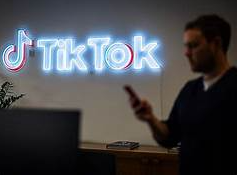US policymakers are turning their attention to TikTok following the Chinese spy balloon debacle.
Editor’s note: On 23 March, TikTok’s CEO Shou Zi Chew attempted to defend TikTok’s data protection and security policies during a combative US congressional hearing. Lawmakers indicated they were not satisfied with new measures intended to protect American users’ data.
WASHINGTON – The recent sighting of a suspected Chinese surveillance balloon hovering over the United States brought new attention to the issue of national security vulnerabilities linked to China. The balloon, which was tracked across the country by major media outlets, especially over sensitive military sites, acted as a stark reminder of the growing concerns Washington policymakers have about Chinese surveillance activities. Long before the balloon was shot down in early February, the spotlight had already shifted to other perceived threats from China, including the popular app TikTok.
In the aftermath of the balloon’s appearance, TikTok has found itself at the center of a heated debate about national security risks posed by Chinese technology. Owned by ByteDance, a company based in Beijing, TikTok has faced intense scrutiny from US lawmakers who fear that the app could be a tool for espionage or data harvesting by the Chinese government. These concerns are compounded by China’s growing influence in global technology markets, with many calling for stronger regulatory action against Chinese-owned tech firms in the US.
The political climate surrounding TikTok became more charged on 23 March during a US congressional hearing, where TikTok CEO Shou Zi Chew was grilled by lawmakers. Chew attempted to defend his company’s data privacy measures, which include efforts to store data within the US and adopt tighter user data controls. However, his assurances did little to calm the growing unease, with many lawmakers expressing skepticism over whether these measures would truly safeguard American data from potential misuse.
Despite TikTok’s efforts to protect its image, the platform is increasingly seen as a pawn in the broader geopolitical struggle between the US and China. The app, with its 100 million active users in the US, has become a lightning rod for concerns over Chinese influence, prompting calls for drastic measures from US policymakers. Some have suggested an outright ban, while others have advocated for more stringent regulations on foreign-owned apps operating in the US.
The growing tension surrounding TikTok reflects the broader fraying of US-China relations, which have been marked by rising competition, trade disputes, and mutual distrust. As the US seeks to limit China’s access to sensitive data and technological infrastructure, the fate of TikTok remains uncertain. Lawmakers are divided on the best course of action, but the possibility of a ban or further regulatory crackdowns looms larger with each passing day.
As this high-stakes debate unfolds, the future of TikTok in the US hangs in the balance. The outcome could have profound implications not only for the platform’s continued presence in America but also for the broader relationship between the two superpowers. The ongoing scrutiny of TikTok is just one example of the increasing tension over China’s growing influence in the digital space, a trend that shows no signs of slowing down in the foreseeable future.

